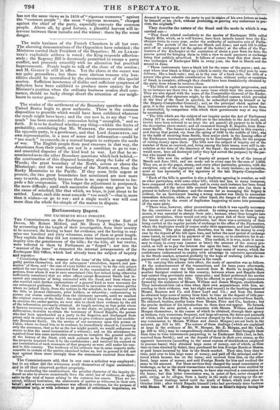The stories of the settlement of the Boundary question with
the United States begin to grow authentic. There is the common disposition to grumble which would have been exhibited whatever the result might have been ; and the cue now is, to say that "too much" has been conceded ; concession being " unenglish," and so forth. It is to be doubted whether any thing—within the limits of probability, considering that Mr. WEBSTER, the representative of the opposite party, is a gentleman, and that Lord ASHBURTON, our own representative, is a man of sense and information—could be "too much" to concede, in a mutual bargain to extirpate the seeds of war. The English people from past excesses in that way, the Americans from their youth, are not in a condition to go to war ; and unsettled disputes of the kind lead to war. Let that be re- membered as to the other Boundary questions which lurk behind,— the continuation of this disputed boundary along the Lake of the Woods; the great boundary of the North, across or above the Mississippi; and the vast boundary of the North-west, from the Rocky Mountains to the Pacific. If they seem little urgent at present, the two great boundaries last mentioned are now more easy to settle, precisely because there is no urgent interest to im- pede a fair compromise. The longer the adjustment is postponed, the more difficult ; until each successive dispute may grow to be the cause of mischief, like that which, we hope, is just about to be settled. Later, each side must concede "too much "—that is, more than it wishes—or go to war : and a single week's war will cost more than the whole fee-simple of the matter in dispute.


























 Previous page
Previous page